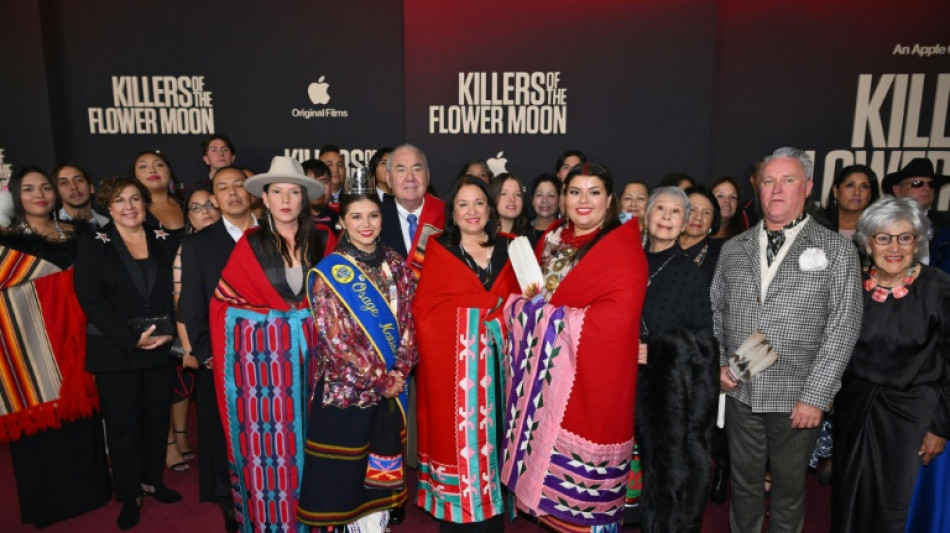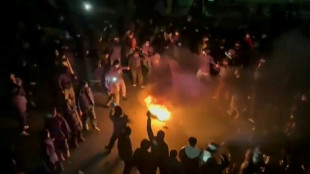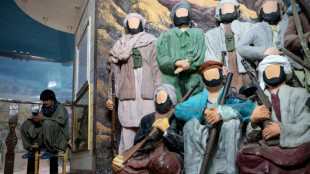
-
 Athens hit with several months of rain in one day: expert
Athens hit with several months of rain in one day: expert
-
Ubisoft shares plunge after big-bang restructuring announced

-
 Mendis' unbeaten 93 anchors Sri Lanka to 271-6 against England
Mendis' unbeaten 93 anchors Sri Lanka to 271-6 against England
-
Reeling Napoli face Juve after 'unacceptable' Champions League showing

-
 Actor Liz Hurley in tears as accuses UK tabloid of 'monstrous' conduct
Actor Liz Hurley in tears as accuses UK tabloid of 'monstrous' conduct
-
What we know about Trump's Greenland 'framework' deal

-
 Osaka 'confused' as testy exchange sours Australian Open win
Osaka 'confused' as testy exchange sours Australian Open win
-
Trump launches 'Board of Peace' at Davos

-
 Stocks rally as Trump drops Greenland tariff threats
Stocks rally as Trump drops Greenland tariff threats
-
Mercedes unveil 2026 F1 car for new 2026 rules

-
 Djokovic, Sinner plough on in Melbourne, Wawrinka makes history
Djokovic, Sinner plough on in Melbourne, Wawrinka makes history
-
Kitzbuehel's Hahnenkamm, the terrifying Super Bowl of skiing

-
 'Oasis of stability': Madrid becomes luxury housing haven
'Oasis of stability': Madrid becomes luxury housing haven
-
Swiatek says packed tennis season makes it 'impossible' to switch off

-
 Sloppy Osaka grinds past 'mad' Cirstea to stay alive at Australian Open
Sloppy Osaka grinds past 'mad' Cirstea to stay alive at Australian Open
-
Iran Guards chief says 'finger on trigger', warns US against 'miscalculations'

-
 Imperious Sinner barrels into Australian Open round three
Imperious Sinner barrels into Australian Open round three
-
Storms, heavy rain kill 9 children across Afghanistan

-
 Games giant Ubisoft suffers share price collapse
Games giant Ubisoft suffers share price collapse
-
Exhausted Wawrinka battles on in Melbourne farewell after five-set epic

-
 'Too dangerous to go to hospital': a glimpse into Iran's protest crackdown
'Too dangerous to go to hospital': a glimpse into Iran's protest crackdown
-
Bruised European allies wary after Trump's Greenland climbdown

-
 Austrian ex-agent goes on trial in Russia spying case
Austrian ex-agent goes on trial in Russia spying case
-
Japan suspends restart of world's biggest nuclear plant

-
 Djokovic, Swiatek roll into Melbourne third round, Keys defence alive
Djokovic, Swiatek roll into Melbourne third round, Keys defence alive
-
New Zealand landslips kill at least two, others missing

-
 Djokovic says heaving Australian Open crowds 'good problem'
Djokovic says heaving Australian Open crowds 'good problem'
-
Swiatek in cruise control to make Australian Open third round

-
 Austrian ex-agent to go on trial in Russia spying case
Austrian ex-agent to go on trial in Russia spying case
-
Bangladesh launches campaigns for first post-Hasina elections

-
 Afghan resistance museum gets revamp under Taliban rule
Afghan resistance museum gets revamp under Taliban rule
-
Multiple people missing in New Zealand landslips

-
 Sundance Film Festival hits Utah, one last time
Sundance Film Festival hits Utah, one last time
-
Philippines convicts journalist on terror charge called 'absurd'

-
 Anisimova grinds down Siniakova in 'crazy' Australian Open clash
Anisimova grinds down Siniakova in 'crazy' Australian Open clash
-
Djokovic rolls into Melbourne third round, Keys defence alive

-
 Vine, Narvaez take control after dominant Tour Down Under stage win
Vine, Narvaez take control after dominant Tour Down Under stage win
-
Chile police arrest suspect over deadly wildfires

-
 Djokovic eases into Melbourne third round - with help from a tree
Djokovic eases into Melbourne third round - with help from a tree
-
Keys draws on champion mindset to make Australian Open third round

-
 Knicks halt losing streak with record 120-66 thrashing of Nets
Knicks halt losing streak with record 120-66 thrashing of Nets
-
Philippine President Marcos hit with impeachment complaint

-
 Trump to unveil 'Board of Peace' at Davos after Greenland backtrack
Trump to unveil 'Board of Peace' at Davos after Greenland backtrack
-
Bitter-sweet as Pegula crushes doubles partner at Australian Open

-
 Hong Kong starts security trial of Tiananmen vigil organisers
Hong Kong starts security trial of Tiananmen vigil organisers
-
Keys into Melbourne third round with Sinner, Djokovic primed

-
 Bangladesh launches campaigns for first post-Hasina polls
Bangladesh launches campaigns for first post-Hasina polls
-
Stocks track Wall St rally as Trump cools tariff threats in Davos

-
 South Korea's economy grew just 1% in 2025, lowest in five years
South Korea's economy grew just 1% in 2025, lowest in five years
-
Snowboard champ Hirano suffers fractures ahead of Olympics


Scorsese 'Flower Moon' epic based on real Native American past
Martin Scorsese's new film "Killers of the Flower Moon" recounts how the Osage nation of Native Americans gained significant oil wealth in the early 20th century and the murderous plot by outsiders to seize it.
Ahead of the movie's US release, AFP looks at the real-life story behind the film, which was adapted from US author David Grann's 2017 book of the same name.
- Who are the Osage? -
The Osage, a Native American nation which grew out of the Ohio and Mississippi River valleys, was forcibly relocated by the US government in the late 19th century westward to a reservation in what would later become the central state of Oklahoma.
As the new proprietors of the land, the nation in 1906 negotiated a rare agreement with the federal government giving Osage members exclusive mineral rights which could not be transferred or sold, only inherited.
Not long after, prospectors discovered that the Osage Reservation lied on an enormous oil reserve.
With demand for oil skyrocketing, the Osage quickly gained wealth.
In 1923 alone, according to Grann, the nation earned the equivalent of more than $400 million in today's money.
White settlers flocked to the area to take advantage of the black gold windfall.
They set up businesses, married members of the tribe or became managers of the Osage members' fortunes.
In 1921, Congress passed a racist law requiring Native Americans to have a guardian of the oil wealth appointed until they proved their "competency."
- What was the Reign of Terror? -
From 1921 to 1925, a series of murders and suspicious deaths struck the Osage Nation, who have dubbed the period the "Reign of Terror."
Mollie Kyle Burkhart's family was particularly hard-hit. Her sister Anna Kyle Brown was shot in the head in 1921, and their mother Lizzie died a few months later of suspected poisoning.
Rita Smith, another of Mollie's sisters, and husband Bill died after a bomb exploded in their home in 1923.
Their distant cousin, Henry Roan, was also found shot in the head the same year.
The Osage nation states on its website that at least 60 people were killed during this period, but that there were potentially even more murders, as some suspicious deaths were never investigated.
- Federal investigation -
With the death toll mounting, US authorities relaunched an investigation in 1925 under the auspices of the Bureau of Investigation, a forerunner of today's FBI.
After months of investigation, the federal officials uncovered an intra-family plot.
Burkhart's husband Ernest, a white settler, and his uncle William Hale, a wealthy white rancher, had orchestrated the murders in order to take control of their oil rights.
Ernest Burkhart and Hale, after attempting to cover up the crimes, were convicted of murder and received life sentences in 1926 and 1929.
Grann alleges in his book that other murders, which went without convictions due to a lack of evidence, are almost all attributed to people from outside the nation seeking to seize Osage oil rights.
- Today -
Around a quarter of the shares of the reservation's oil rights are held today by non-Osages. Most of the oil has since dried up, however, and royalty checks now amount to only a few thousand dollars.
The Osage Nation is nonetheless pushing for federal legislation that would allow the non-Osages' shares to be gifted or sold back to the nation.
The murders of the 1920s left an indelible mark on the memory of the Osage community, which was heavily involved in the making of Scorsese's film.
Alongside stars Leonardo DiCaprio and Robert De Niro, the film features Osage actors, props made by Osage craftworkers and involved work with Osage language experts.
P.Staeheli--VB



